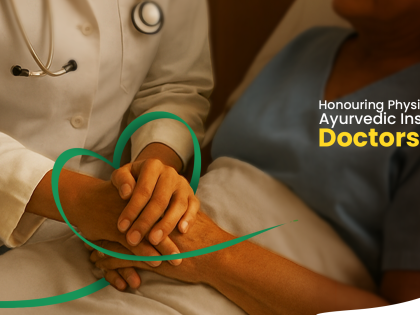Celebrating National Ayurveda Day: The Ancient Science of Holistic Healing

Ayurveda, the ancient Indian science of life, is a holistic healing system that has been practiced for over 5,000 years. Rooted in the belief that health and wellness depend on a delicate balance between the mind, body, and spirit, Ayurveda has stood the test of time. In 2016, the Government of India’s Ministry of Ayush declared the birth anniversary of Dhanvantari as National Ayurveda Day. The first Ayurveda Day was first celebrated on 28 October 2016.
The Significance of Ayurveda Day
Ayurveda Day celebrates the ancient wisdom of Ayurveda, highlighting its holistic approach to health and well-being. It promotes awareness of natural remedies and sustainable practices for maintaining balance in life. The day encourages the integration of Ayurvedic principles into modern lifestyles, fostering prevention and self-care. It also serves as a reminder of the importance of herbal medicine and traditional healing methods. Overall, Ayurveda Day aims to inspire individuals to embrace a healthier, more balanced way of living.
Ayurveda’s Holistic Approach
Unlike conventional medicine, which often focuses on treating symptoms, Ayurveda emphasizes a holistic approach. It aims to address the root cause of health issues, promoting balance within the body through personalized treatments based on an individual’s unique constitution or “dosha’, mental and emotional well-being, and environmental influences. This balance is achieved through a combination of personalized diet, lifestyle adjustments, and natural remedies.
Ayurveda offers numerous benefits, including detoxification, stress relief, improved digestion, and enhanced immunity. Ayurveda for better immunity is especially vital today, as people seek natural ways to strengthen their defences against infections and health issues. Ayurvedic herbs such as Ashwagandha, Tulsi, and Amla have been revered for their immune-boosting properties for centuries. These herbs are now readily available in a variety of Ayurvedic products like supplements, teas, and syrups.
Ayurveda in Modern Health
The importance of Ayurveda in today’s health is clear. With stress, pollution, and processed foods causing many lifestyle diseases, Ayurveda offers a natural approach. It emphasizes a balanced lifestyle, healthy diet, regular exercise, and mental well-being. Practices like yoga and meditation, which are part of Ayurveda, help reduce stress and improve both mental and physical health. Similarly, Ayurvedic detoxification methods, such as Panchakarma, help rid the body of toxins, promoting rejuvenation and longevity.
With the growing awareness of natural and holistic healing, more people are turning to Ayurveda. The availability of Ayurvedic medicine online allows individuals to access a wide range of products tailored to their health needs. Whether you’re looking for digestive support, joint relief, or immune-boosting solutions, Ayurvedic remedies provide time-tested alternatives to synthetic medicines.
Celebrating Ayurveda in Daily Life
Ayurveda Day is an opportunity to reflect on the importance of natural healing and how we can incorporate these principles into our daily lives. Simple changes, like adopting an Ayurvedic diet, practicing yoga, and using natural herbs, can significantly improve overall health. Incorporating Ayurvedic products like herbal oils, teas, and supplements into your routine can also support long-term wellness. This Ayurveda Day, take a moment to explore the richness of this ancient science. Whether it’s through the convenience of purchasing Ayurvedic medicine online or practicing mindfulness and balance in your daily routine, Ayurveda offers a path to holistic health that nurtures the body, mind, and spirit.
By embracing the wisdom of Ayurveda, we not only celebrate its ancient roots but also its continuing role in promoting health and healing in the modern world.
Disclaimer
The content here is for informational and educational purposes only. It is not intended for medical advice. It does not take the place of medical advice or treatment from a physician. Readers should consult their own doctor or a qualified healthcare professional for specific health concerns and questions.






